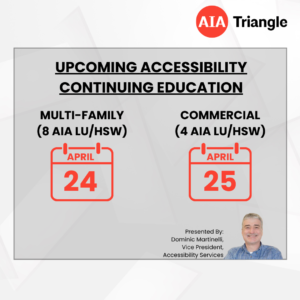
- This event has passed.
Multi Family Accessibility (Earn 8 HSW)
April 24, 2024 | 8:00 am - 5:00 pm
$75.00 – $195.00
| MULTI FAMILY ACCESSIBILITY (8 AIA LU/HSW) |
| Wednesday, April 24, 2024 | 8:00 AM – 5:00 PM |
| MAXIMUM CAPACITY IS 125 ATTENDEES |
| (Registration Deadline: Friday, April 19 @ 5:00 PM) |
| In-person only | Lunch will be provided |
| Burns Auditorium, NCSU Campus |
| Boney Dr, Raleigh, NC 27607
8 LU|HSW |
- AIA Members/AIA Triangle Annual Partners: $135
- AIA Members with ‘Associate AIA’ designation: $75
- Non-members: $195
AGENDA
8 am to 11 am
Applying the 2024 North Carolina Building Code & A117.1 – 2017 to your Residential Projects:
Tara Barthelmess, North Carolina Department of Insurance (NCDOI)
Dom Marinelli, Accessibility Services
11 am to 11:30
Preparing Site, Civil and Landscape Plans for Accessibility & Site Impracticality
Rob Guarnieri, Accessibility Services
11:30 to 12:30 pm
The Law & Defending Fair Housing Act Accessibility Complaints
Terry Kitay, Baker, Donelson, Bearman, Caldwell & Berkowitz, PC
12: 30 pm to 1:30 pm
Lunch
1:30 pm to 2:30 pm
The 2024 Edition of A117.1 is almost ready
Marsha Mazz, Accessibility Services
Nathan Roether Accessibility Services
2:30 pm to 3:30 pm
WAIT: What about R-2 Occupancies in Existing Buildings
Robert Reed, Accessibility Services
3:30 pm to 4:30 pm
Typical Issues During Accessibility Inspections
Regina Trantham
4:30 pm to 5 pm
Differences in more restrictive provisions for publicly-funded facilities
North Carolina Housing Finance Agency
Course code: NCRESMF22 8 hours HSW
REFUND POLICY
Refunds must be requested in writing (by email) 5 business days prior to the program date. AIA Triangle withholds the right to deny or approve any refund based on condition or circumstance.
Requirements that impact multi-family housing accessibility, as found in the Fair Housing Accessibility Guidelines, the 2018 NC Building Code and its Accessibility Standard A117.1 – 2009, the 2010 ADA Standards and new safe harbor standards approved by the US Department of Housing and Urban Development (HUD) for compliance with the Federal Fair Housing Act Accessibility Guidelines.
- Upon completion of this program, participants will review relevant areas from the 2010 ADA Standards for Accessible Design will also be reviewed. Participants will examine problem application areas in applying these requirements to public and common-use areas including exterior amenities, exterior accessible routes, accessible parking, and interior features (mail rooms, fitness centers, community rooms, kitchens, etc.)
- Participants will understand the differences of the new North Carolina Building Code and its impact on Residential Occupancies.
- Participants will recognize requirements within residential units with focus on the different requirements applicable to Type A and Type B Units including unit entries, door thresholds, kitchen clearances, appliances, bathroom clearances, fixtures, patios/balconies, and operable parts within the dwelling unit.
- Participants will understand how Section 504 of the Rehabilitation Act of 1973 and the Uniform Federal Accessibility Standards (UFAS) impact publicly funded projects including the North Carolina Housing Finance Agency. Participants will further identify and distinguish settlements and court cases along with common issues on accessibility plan reviews.
- Participants will understand the differences between A117.1 – 2009 and A117.1 – 2017 (the updated Accessibility Standard being referenced in jurisdictions referencing the 2021 edition of the International Building Code (IBC)
- Participants will understand Department of Justice’s Accessibility Inspection Protocol (DOJ is the Federal Agency that enforces the Federal Fair Housing Act Accessibility Guidelines)
 Dominic Martinelli, Vice President, Accessibility Services
Dominic Martinelli, Vice President, Accessibility Services
Mr. Marinelli is a certified Accessibility Specialist/Plans Examiner by the International Code Council and serves on various committees including American National Standard Institute Residential Committee which he serves as Chair. He also represented the United Spinal Association on the US Access Board’s Emergency Transportable Housing Advisory Committee.
Mr. Marinelli holds a Master of Science from the State University of New York at Buffalo. He is certified in code enforcement by the New York State Department of State Codes Division and as an Accessibility Specialist/Plans Examiner by the International Codes Council (ICC).